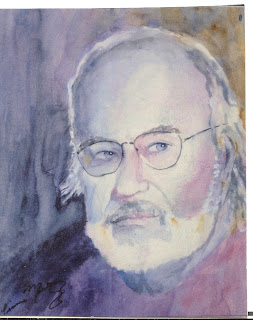




REPORT FROM FLAG:
Merry Christmas
As most of us know but often forget, life is chancy. During the great Schultz Fire that wiped out a mountain side and set the conditions for a flood, the local newspaper, the Arizona Daily Sun, ran an article about an earthquake fault that run along Lake Mary Road, a few yards down the hill from our house. The floods came, devastating many of the homes to the northeast of Flagstaff. We even had tornadoes come near us in Bellemont, about ten miles to the west. However, the land is gorgeous all year long with the great Ponderosa pines and the foliage of the oaks, maples, and aspens in the fall. The air is clear, and for us life has been unbelievably good.
Both Gretchen and I are doing exactly what we want to do with no one bossing us around since we have no employers. We both think this is the happiest time in our lives. In addition to her rewarding participation in Soroptomists, Gretchen is putting her creativity and sense of style to work making jewelry and selling it, too, for handsome figures. I write and edit the Master Gardening Column for the Arizona Daily Sun and tutor at the Literacy Center. We both garden in the Spring, Summer, and Autumn.
I just had my annual checkup at the VA Clinic in Bellemont and passed with flying colors. Indeed, the staff likes to see me coming because I am so healthy. Not to brag, but my LDL, that’s the bad cholesterol is now 48, a very low number. Of course, pills helped. Gretchen, too, is in good health.
Roxie, too, is fit as a fiddle for a twelve year old dog. The vet who gave her to us in Temecula, Michelle Brennan, gave her some shots that really perked up the old girl, and she now accompanies me to the Literacy Center twice a week where she has pooped only once.
We have a delightful group of neighbors with all sorts and conditions of backgrounds. They often stop by in the afternoon for a glass of wine and conversation. The nice thing is that they don’t treat either of us as “senior citizens,” a phrase, I abhor, except that Stan clears our driveway with his snow blower.
Now, for the real bragging. My granddaughter and namesake and the love of Gretchen’s life, Dana Marie, graduated with honors from Loyola Law School in Los Angeles last May and passed the California Bar last November on the first try. She’s had great support from her grandmother, Grace Marie, and her mother, Elizabeth, and stepfather, Michael, and they must be proud out of their minds. It is very nice to have a grandchild who is smarter than I am. In addition to all of that, she immediately got a job. She’s a tall California blonde beauty with blue eyes who’s as sweet as candy and smart as a whip.
We’ve also become party animals, going to two Christmas parties in the same night.
Flagstaff is a unique town. It is hochkultur and down-home, country western. The nearest big city to the West is Los Angeles, to the East Albuquerque, and to the South Phoenix. To the north, once past the Grand Canyon, there is a vast void of awe-inspiring beauty. We are close by the Hopi Reservation and cheek by jowl with the Navajo Reservation. Northern Arizona University is in town which helps raise the cognitive level of the town along with the National Park Service, the Forest Service, the US Geological Survey, a Naval Observatory, and the Lowell Observatory. Of course, we have the IRS and FBI which, so far, haven’t bothered us.
When we went to California for Thanksgiving with all the family, we relished once again California’s beauty, especially the green and color. We had a great time, and I’m happy to report that no one is in rehab or jail. Tim is retiring from the LA County Fire Dept. Paul is still surfing. Elizabeth has become a first-rate cook and is still working to pay for Dana Marie’s education. Michael is a successful business man.
Of course, the real meaning of all this is the gift of the Christ Child which calls to mind that all of it is a gift for which we should all be grateful. The longer I live the more I realize that Jesus is our Emmanuel, God with us. Amen.
Gretchen and Dana
